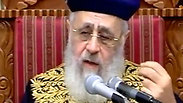
Chief Rabbi Yitzhak Yosef
Justice Ministry mulling disciplinary, criminal steps against chief rabbi
In the wake of remarks by Chief Rabbi Yitzhak Yosef, who compared 'negros' to 'monkeys' in a Torah lesson, the National Anti-Racism Coordinator's Office is looking into 'administrative, disciplinary and even criminal' measures against Yosef, saying his words could constitute incitement to racism.
The National Anti-Racism Coordinator's Office, which is part of the Justice Ministry, is examining disciplinary and legal steps against Israel's Chief Rabbi Yitzhak Yosef after he compared "negros" to "monkeys."
Attorney Awaka (Kobi) Zana, the head of the anti-racism unit, called the chief rabbi's comments "very severe," noting that "it's are enough to justify different measures against the rabbi on the administrative, disciplinary and even criminal levels—to the extent it becomes evident the remarks constitute incitement to racism."
A statement from the National Anti-Racism Coordinator's Office said it is "examining different steps on this matter, and to that end has turned to relevant authorized officials requesting to check and clarify these comments, so the matter can be examined in depth and the proper steps can be taken."
"The unit will continue monitoring the remarks and take every necessary step to prevent a repeat of such racist comments from civil service employees and public service providers in the future," the statement went on to say.
During his lesson on the weekly Torah portion of Vayakhel-Pekudei, the chief rabbi spoke about the blessings of trees which is a customary ritual during the month of Nissan.
The halachic question revolves around whether to bless one tree or at least two, and in this context, Rabbi Yosef offered examples of other blessings, for example the blessing of "strange creatures" that evoke attention or repulsion, rather than aesthetic pleasure.
"We don’t say a blessing for every negro … He needs to be a negro whose father and mother are white … if you know, they had a monkey for a son, they had a son like that,” Rabbi Yosef said.
A statement issued on Rabbi Yosef’s behalf insisted that “The words of the rabbi are quoted from the Babylonian Talmud in Berakhot. R. Joshua b. Levi said: 'On seeing pockmarked persons one says: Blessed be He who makes strange creatures. An objection was raised: If one sees a negro … he says: Blessed be He who makes strange creatures…. Our Rabbis taught: On seeing an elephant, an ape, or a long-tailed ape, one says: Blessed is He who makes strange creatures.’”
Rabbi Yosef's comments got international coverage as well, and condemnations came flooding in from across the globe. Among others, he was criticized for his remarks by Britain’s Chief Rabbi Ephraim Mirvis and the Anti-Defamation League in the US.
Tebeka, an advocacy NGO for equality and justice for Ethiopian Israelis, demanded the chief rabbi issue an apology "for the use of the offensive words that have been recognized as slander by the courts in the State of Israel."
The NGO's executive director, Fentahun Assefa-Dawit, sent a letter to the Chief Rabbinate and the minister of religious services protesting the chief rabbi's comments and noting examples of anti-racism legislation that bars the use of the word "kushi," which is the Hebrew equivalent of "negro."
"The Tebeka NGO firmly and harshly condemns such remarks, which are made under the guise of 'kosher' comments that appear in Jewish texts and could give dangerous legitimization to the general public to make use of these grave words," Assefa-Dawit wrote.











